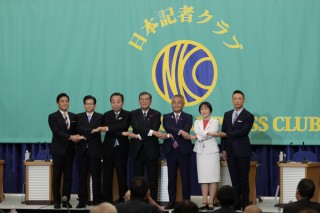Loading
Search
▼ Japan Party Leaders Clash Over Reform, Economy In Election Debate
- Category:Other
Japan's party leaders clashed on issues including political reform, the economy and national security during a seven-way debate Saturday held ahead of the lower house election later this month.
Newly installed Prime Minister Shigeru Ishiba from the ruling Liberal Democratic Party repeated his pledge to "renew" the country's economy and disaster resilience, stopping short of giving details on planned economic measures.
Amid rising prices, some opposition parties have argued for a reduction in or the abolition of the sales tax, but Ishiba pushed back by saying it is an important source of revenue for social security and that he is not considering bringing the rate down.
"A wage increase that outpaces price rises is important," Ishiba said.
Yoshihiko Noda, the newly chosen leader of the main opposition Constitutional Democratic Party of Japan, said his party would support low- and middle-income earners by partially refunding sales tax.
Ishiba came under fire from opposition party heads and journalists during the debate over the LDP's slush fund scandal in which some factions underreported income from fundraisers, as well as over his decision to approve some LDP lawmakers implicated in the scandal to run for the party in the Oct 27 election.
Noda accused Ishiba of attempting to "hide" the slush funds issue by holding the election soon after he became prime minister.
Noda said he has not given up on coordinating with other opposition parties to have one candidate run against the LDP candidate in single-seat districts, but other parties were less willing to join hands before the election, with Japanese Communist Party Chair Tomoko Tamura rejecting the idea citing policy differences on security issues.
Other leaders at the debate at the Japan National Press Club were the LDP junior coalition partner Komeito party's Keiichi Ishii, Japan Innovation Party's Nobuyuki Baba, Yuichiro Tamaki from the Democratic Party for the People and Taro Yamamoto from Reiwa Shinsengumi.
Among other issues debated between the leaders was Japan's stance on nuclear weapons, a day after the atomic bomb survivors' group Nihon Hidankyo was named the recipient of the 2024 Nobel Peace Prize.
Japan, the only country to have experienced a nuclear bombing in war, does not recognize the Treaty on the Prohibition of Nuclear Weapons that outright bans the arms. Noda said Japan should be an observer in the treaty, while Ishiba said he wanted debate on "whether deterrence and nuclear arms abolition can be achieved at the same time."
© KYODO
Newly installed Prime Minister Shigeru Ishiba from the ruling Liberal Democratic Party repeated his pledge to "renew" the country's economy and disaster resilience, stopping short of giving details on planned economic measures.
Amid rising prices, some opposition parties have argued for a reduction in or the abolition of the sales tax, but Ishiba pushed back by saying it is an important source of revenue for social security and that he is not considering bringing the rate down.
"A wage increase that outpaces price rises is important," Ishiba said.
Yoshihiko Noda, the newly chosen leader of the main opposition Constitutional Democratic Party of Japan, said his party would support low- and middle-income earners by partially refunding sales tax.
Ishiba came under fire from opposition party heads and journalists during the debate over the LDP's slush fund scandal in which some factions underreported income from fundraisers, as well as over his decision to approve some LDP lawmakers implicated in the scandal to run for the party in the Oct 27 election.
Noda accused Ishiba of attempting to "hide" the slush funds issue by holding the election soon after he became prime minister.
Noda said he has not given up on coordinating with other opposition parties to have one candidate run against the LDP candidate in single-seat districts, but other parties were less willing to join hands before the election, with Japanese Communist Party Chair Tomoko Tamura rejecting the idea citing policy differences on security issues.
Other leaders at the debate at the Japan National Press Club were the LDP junior coalition partner Komeito party's Keiichi Ishii, Japan Innovation Party's Nobuyuki Baba, Yuichiro Tamaki from the Democratic Party for the People and Taro Yamamoto from Reiwa Shinsengumi.
Among other issues debated between the leaders was Japan's stance on nuclear weapons, a day after the atomic bomb survivors' group Nihon Hidankyo was named the recipient of the 2024 Nobel Peace Prize.
Japan, the only country to have experienced a nuclear bombing in war, does not recognize the Treaty on the Prohibition of Nuclear Weapons that outright bans the arms. Noda said Japan should be an observer in the treaty, while Ishiba said he wanted debate on "whether deterrence and nuclear arms abolition can be achieved at the same time."
© KYODO
- October 13, 2024
- Comment (0)
- Trackback(0)


